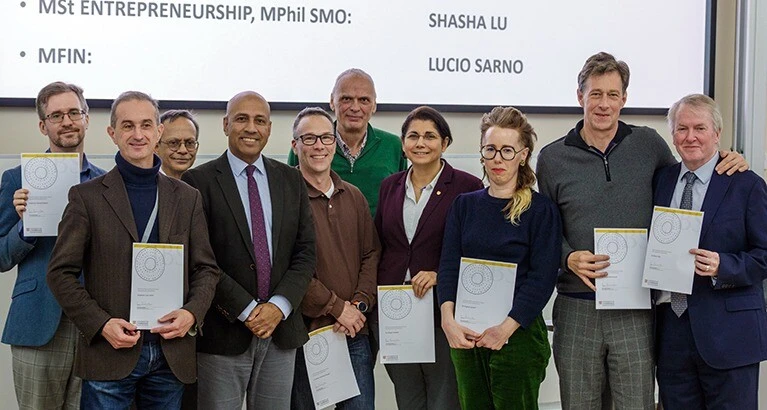Professor of Operations Research
Academic Director of the Centre for Risk Studies (CRS)
Director of Studies in Management Studies and Fellow of Churchill College
BSc (University of Melbourne), MS, PhD (University of Wisconsin)
My research interests include management of systemic and emerging risks, business decision making, risk aversion in electricity markets, methods and models for optimisation problems and equilibrium systems. I’m a member of the Australian Mathematical Society, INFORMS and the Mathematical Optimization Society.
I’m part of the Operations and Technology Management subject group at Cambridge Judge Business School, which focuses on practice-based research through partner organisations to address a wide spectrum of management challenges.

Professional experience
Professor Ralph is a member of the Australian Mathematical Society, INFORMS and the Mathematical Optimization Society. He is Area Editor for Environment, Energy and Sustainability at Operations Research. He was Editor-in-Chief of Mathematical Programming (Series B) from 2007-2013 and has served on the editorial boards of Mathematics of Operations Research and the SIAM Journal on Optimization, as well as the SIAM-MPS book series on optimisation.
Previous appointments
Following post-doctoral research at Cornell University, Professor Ralph was Lecturer and then Senior Lecturer at the University of Melbourne in Australia.
Publications
- Selected publications
- Journal articles
- Special issues of journals
- Books, monographs, reports and case studies
- Book chapters
- Conference papers
- Working papers
Selected publications
- Feylessoufi, A., Kavadias, S. and Ralph, D. (2024) “Behavioral microfoundations of new practice adoption: the effects of rewards, training and population dynamics.” Management Science, 70(10): 6685-6703 (DOI: 10.1287/mnsc.2022.00305)
- Lange, R.-J., Ralph, D. and Støre, K. (2020) “Real-option valuation in multiple dimensions using Poisson optional stopping times.” Journal of Financial and Quantitative Analysis, 55(2): 653-677 (DOI: 10.1017/S0022109019000048)
- Parpas, P., Ralph, D. and Wiesemann, W. (eds.) (2018) “Special issue on optimization models and algorithms for data science.” Mathematical Programming, 167(1) (DOI: 10.1007/s10107-017-1217-5)
- Kopec, G.M., Allwood, J.M., Cullen, J.M. and Ralph, D. (2015) “A general nonlinear least squares data reconciliation and estimation method for material flow analysis.” Journal of Industrial Ecology, 20(5): 1038-1049 (DOI: 10.1111/jiec.12344)
- Crouzeix, J.-P., Eberhard, A. and Ralph, D. (2015) “(Convex) level sets integration.” Journal of Optimization Theory and Applications, 171(3): 865–886 (DOI: 10.1007/s10957-015-0795-8)
- Ralph, D. and Smeers, Y. (2015) “Risk trading and endogenous probabilities in investment equilibria.” SIAM Journal on Optimization, 25(4): 2589–2611 (DOI: 10.1137/110851778)
Journal articles
- Feylessoufi, A., Kavadias, S. and Ralph, D. (2024) “Behavioral microfoundations of new practice adoption: the effects of rewards, training and population dynamics.” Management Science, 70(10): 6685-6703 (DOI: 10.1287/mnsc.2022.00305)
- Sridhar, K., Ralph, D. and Copic, J. (2021) “3 strategies to secure your digital supply chain.” Harvard Business School, 9 August 2021
- Lange, R.-J., Ralph, D. and Støre, K. (2020) “Real-option valuation in multiple dimensions using Poisson optional stopping times.” Journal of Financial and Quantitative Analysis, 55(2): 653-677 (DOI: 10.1017/S0022109019000048)
- Oughton, E., Ralph, D., Pant, R., Leverett, E., Copic, J., Thacker, S., Dada, R., Ruffle, S., Tuveson, M. and Hall, J.W. (2019) “Stochastic counterfactual risk analysis for the vulnerability assessment of cyber-physical attacks on electricity distribution infrastructure networks.” Risk Analysis, 39(9): 2012-2031 (DOI: 10.1111/risa.13291)
- Crouzeix, J.-P., Eberhard, A. and Ralph, D. (2015) “(Convex) level sets integration.” Journal of Optimization Theory and Applications, 171(3): 865–886 (DOI: 10.1007/s10957-015-0795-8)
- Kopec, G.M., Allwood, J.M., Cullen, J.M. and Ralph, D. (2015) “A general nonlinear least squares data reconciliation and estimation method for material flow analysis.” Journal of Industrial Ecology, 20(5): 1038-1049 (DOI: 10.1111/jiec.12344)
- Ralph, D. and Smeers, Y. (2015) “Risk trading and endogenous probabilities in investment equilibria.” SIAM Journal on Optimization, 25(4): 2589–2611 (DOI: 10.1137/110851778)
- Hult, E., Jiang, H. and Ralph, D. (2014) “Exact computational approaches to a stochastic uncapacitated single allocation p-hub center problem.” Computational Optimization and Applications, 59(1/2): 185-200 (DOI: 10.1007/s10589-013-9629-5)
- Wogrin, S., Hobbs, B.F., Ralph, D., Centeno, E. and Barquín, J. (2013) “Open versus closed loop capacity equilibria in electricity markets under perfect and oligopolistic competition.” Mathematical Programming, 140(2): 295-322 (DOI: 10.1007/s10107-013-0696-2)
- Ralph, D. and Xu, H. (2011) “Convergence of stationary points of sample average two-stage S stochastic programs: a generalized equation approach.” Mathematics of Operations Research, 36(3): 568-592 (DOI: 10.1287/moor.1110.0506)
- Crouzeix, J.-P., Eberhard, A. and Ralph, D. (2010) “A geometrical insight on pseudoconvexity and pseudomonotonicity.” Mathematical Programming, 123(1): 61-83 (DOI: 10.1007/s10107-009-0324-3)
- Giallombardo, G. and Ralph, D. (2008) “Multiplier convergence in trust-region methods with application to convergence of decomposition methods for MPECs.” Mathematical Programming, 112(2): 335-369 (DOI: 10.1007/s10107-006-0020-5)
- Goulart, P.J., Kerrigan, E.C. and Ralph, D. (2008) “Efficient robust optimization for robust control with constraints.” Mathematical Programming, 114(1): 115-147 (DOI: 10.1007/s10107-007-0096-6)
- Pang, J.-S. and Ralph, D. (2008) “Foreword: Special issue on nonlinear programming, variational inequalities, and stochastic programming.” Mathematical Programming, 117(1-2): 1-4 (DOI: 10.1007/s10107-007-0169-6)
- Ralph, D. (2008) “Mathematical programs with complementarity constraints in traffic and telecommunications networks.” Royal Society of London. Philosophical Transactions. Mathematical, Physical and Engineering Sciences, 366(1872): 1973-1987 (DOI: 10.1098/rsta.2008.0026)
- Hu, X. and Ralph, D. (2007) “Using EPECs to model bilevel games in restructured electricity markets with locational prices.” Operations Research, 55(5): 809-827 (DOI: 10.1287/opre.1070.0431)
- Fletcher, R., Leyffer, S., Ralph, D. and Scholtes, S. (2006) “Local convergence of SQP methods for mathematical programs with equilibrium constraints.” SIAM Journal on Optimization, 17(1): 259-286
- Giallombardo, G. and Ralph, D. (2006) “Multiplier convergence in trust-region methods with application to convergence of decomposition methods for MPECs.” Mathematical Programming, 2 September (DOI: 10.1007/s10107-006-0020-5)
- Ralph, D. and Xu, H. (2005) “Implicit smoothing and its application to optimization with piecewise smooth equality constraints.” Journal of Optimization Theory and Applications, 124(3): 673-699
- Shilton, A., Palaniswami, M., Ralph, D., Tsoi, A.C. (2005) “Incremental training of support vector machines.” IEEE Transactions on Neural Networks, 16(1): 114-131
- Yang, X.Q. and Ralph, D. (2005) “Characterizations for perturbed exact penalty functions.” Nonlinear Analysis, 62(1): 101-106
- Brockwell, A., Polak, E., Evans, R., Ralph, D. (2003) “Dual-sampling-rate moving-horizon control of a class of linear systems with input saturation and plant uncertainty.” Journal of Optimization Theory and Applications, 116(3): 485-516
- Eberhard, A. and Ralph, D. (2003) “Rank-1 representers.” Journal of Mathematical Sciences, 115(5): 2653-2700
- Jiang, H. and Ralph, D. (2003) “Extension of quasi-Newton methods to mathematical programs with complementarity constraints.” Computational Optimization and Applications, 25(1-3): 123-150
- Hu, X. and Ralph, D. (2002) “A note on sensitivity of value functions of mathematical programs with complementarity constraints.” Mathematical Programming, 93(2): 265-279
- Manzie, C., Palaniswami, M., Ralph, D., Watson, H. and Yi, X. (2002) “Model predictive control of a fuel injection system with a radial basis function network observer.” Transactions of the American Society of Mechanical Engineers Journal of Dynamic Systems Measurement and Control, 124(4): 648-658
- Panchapakesan, C., Palaniswami, M., Ralph, D. and Manzie, C. (2002) “Effects of moving the centers in an RBF network.” IEEE Transactions on Neural Networks, 13(6): 1299-1307
- De Bremaecker, J., Ferris, M. and Ralph, D. (2000) “Compressional fractures considered as contact problems and mixed complementarity problems.” Engineering Fracture Mechanics, 66(3): 287-303
- Jiang, H. and Ralph, D. (2000) “Smooth SQP methods for mathematical programs with nonlinear complementarity constraints.” SIAM Journal of Optimization, 10(3): 779-808
- Neame, P., Boland, N. and Ralph, D. (2000) “An outer approximate subdifferential method for piecewise affine optimization.” Mathematical Programming, 87(1): 57-86
- Ralph, D. and Wright, S.J. (2000) “Superlinear convergence of an interior-point method despite dependent constraints.” Mathematics of Operations Research, 25(2): 179-194
- Jiang, H. and Ralph, D. (1999) “QPECgen, a MATLAB generator for mathematical programs with quadratic objectives and affine variational inequality constraints.” Computational Optimization and Applications, 13(1-3): 25-49 (DOI: 10.1023/A:1008696504163)
- Churilov, L., Ralph, D. and Sniedovich, M. (1998) “A note on composite concave quadratic programming.” Operations Research Letters, 23(3-5): 163-169
- Ralph, D. and Scholtes, S. (1997) “Sensitivity analysis of composite piecewise smooth equations.” Mathematical Programming, 76(3): 593-611
- Pang, J.-S. and Ralph, D. (1996) “Piecewise smoothness, local invertibility, and parametric analysis of normal maps.” Mathematics of Operations Research, 21(2): 401-426
- Wright, S. and Ralph, D. (1996) “A superlinear infeasible-interior-point algorithm for monotone complementarity problems.” Mathematics of Operations Research, 21(4): 815-838
- Ralph, D. (1994) “Global convergence of damped Newton’s method for nonsmooth equations via the path search.” Mathematics of Operations Research, 19(2): 352-389
Special issues of journals
- Parpas, P., Ralph, D. and Wiesemann, W. (eds.) (2018) “Special issue on optimization models and algorithms for data science.” Mathematical Programming, 167(1) (DOI: 10.1007/s10107-017-1217-5)
- Facchinei, F., Ferris, M.C., Luo, Z.-Q. and Ralph, D. (eds.) (2016) “Special issue on complementarity problems and applications.” Mathematical Programming, 157(2) (DOI: 10.1007/s10107-016-1024-4)
Books, monographs, reports and case studies
- Tuveson, M., Ralph, D. and Alexander, K. (eds.) (2020) Beyond bad apples: risk culture in business. Cambridge: Cambridge University Press.
- Eberhard, A., Hill, R., Ralph, D. and Glover, B.M. (1999) Progress in optimization: contributions from Australasia. Dordrecht: Kluwer Academic Publishers.
- Luo, Z.-Q., Pang, J.-S. and Ralph, D. (1996) Mathematical programs with equilibrium constraints. Cambridge: Cambridge University Press.
Book chapters
- Tuveson, M., Ralph, D. and Alexander, K. (2020) “Conclusion.” In: Tuveson, M., Ralph, D. and Alexander, K. (eds.) Beyond bad apples: risk culture in business. Cambridge: Cambridge University Press, pp.271-275 (DOI: 10.1017/9781316996959.010)
- Tuveson, M. and Ralph, D. (2020) “A network view of tone at the top and the role of opinion leaders.” In: Tuveson, M., Ralph, D. and Alexander, K. (eds.) Beyond bad apples: risk culture in business. Cambridge: Cambridge University Press, pp.73-102 (DOI: 10.1017/9781316996959.004)
- Tuveson, M., Ralph, D. and Alexander, K. (2020) “Introduction.” In: Tuveson, M., Ralph, D. and Alexander, K. (eds.) Beyond bad apples: risk culture in business. Cambridge: Cambridge University Press, pp.1-18 (DOI: 10.1017/9781316996959.001)
- Jiang, H. and Ralph, D. (1998) “Global and local superlinear convergence analysis of Newton-type methods for semismooth equations with smooth least squares.” In Fukushima, M. and Qi, L. (eds.): Reformulation – nonsmooth, piecewise smooth, semismooth and smoothing methods. Boston MA: Kluwer Academic Publishers, pp.181-209
Conference papers
- Jansen, M., Oraiopoulos, N. and Ralph, D. (2014) “Contracting for continuity of mission critical services.” In: INFORMS Annual Meeting, 9-12 November 2014, San Francisco, CA, USA.
- Ralph, D. and Smeers, Y. (2010) “The invisible hand for risk averse investment in electricity generation.” In Chen, B. (ed.): International Conference on Algorithmic Aspects in Information and Management, 6th, 19-21 July, Weihai, PRC.
- Ralph, D. (2006) “Complementarity models and the architecture of energy markets.” In: International Symposium on Mathematical Programming (ISMP), 19th, 30 July-4 August 2006, Rio de Janeiro, Brazil.
- Ralph, D., Xu, H. and Meng, F. (2006) “Regularization methods for stochastic mathematical programs with complementarity constraints.” In: European Conference on Operational Research, 21st (EURO XXI), 2-5 July 2006, Rejkjavik, Iceland.
- Hu, X. and Ralph, D. (2001) “Nash equilibria for games in competitive electricity markets under network constraints.” In Li, D. (ed.) Proceedings of the International Conference on Optimization: Techniques and Applications (5th), 15-17 December 2001, Hong Kong. Hong Kong: Contemporary Development Company, pp.1851-1858
- Jiang, H., Ralph, D. and Tin Loi, F. (1997) “Identification of yield limits as a mathematical program with equilibrium constraints.” In Grzebieta, R.H., Al-Mahaidi, R. and Wilson, J.L. (eds.): Australasian Conference on The Mechanics of Structures and Materials, 15th, Balkema, Rotterdam. Rotterdam: Balkema, pp.399-404
Working papers
- Holmberg, P., Newbery, D. and Ralph, D. (2008) “Supply function equilibria: step functions and continuous representations.” Electricity Policy Research Group Working Papers, No.EPRG0829. Cambridge: University of Cambridge.
- Hu, X., Ralph, D., Ralph, E.K., Bardsley, P. and Ferris, M.C. (2004) “Electricity generation with looped transmission networks: bidding to an ISO.” Judge Institute of Management, Cambridge University, Research Paper No.2004/16
News and insights
Faculty news
2025 Cambridge Judge excellence in teaching awards
Eleven members of the Cambridge Judge Business School faculty are awarded teaching prizes for excellence across the Business School’s various programmes.
ESG and sustainability
How firms can prioritise risks in the low-carbon transition
Six classes of risks, encompassing physical as well as other risks, comprise the Cambridge Taxonomy of Climate Transition Risks. The research-based framework will help firms navigate the challenging transition from fossil fuels to renewable energy, and reflects the broad-based, systemic approach of the Centre for Risk Studies at Cambridge Judge Business School.
Faculty news
Adopting AI: tips for managers implementing change
Firms are wrestling with how to convince staff to use artificial intelligence (AI) and other new technologies. A study led at Cambridge Judge, focusing on social comparisons among employees, cautions against a false dichotomy between full and no adoption.
Media coverage
Cambridge Independent | 1 November 2021
Risilience nets £6m to cut risks of climate change scenarios
Risilience, a new company that commercialises research from the Centre for Risk Studies at Cambridge Judge Business School, is launched with a £6 million Series A investment. The Risilience platform’s company-specific analysis provides detailed, quantified results to support strategic decision making and business planning while balancing investment requirements driven by future scenarios – and is deemed of particular significance as the climate breakdown curveball weaves its way through global, national and local economies. Risilience’s founders are Dr Andrew Coburn, CEO, Professor Daniel Ralph, Chairman, Dr Michelle Tuveson, Chief Client Officer, and Simon Ruffle, Chief Product Officer.
Financial Times | 21 October 2020
Crisis management courses prepare EMBA students for the worst
Daniel Ralph, Professor of Operations Research at Cambridge Judge Business School comments on contingency planning. Professor Ralph teaches Cambridge Executive MBA participants about decision making in uncertain situations and what consequences that might bring. “It sounds elementary, but if you don’t have an inquiring mind, you are less well equipped to deal with change,” he says.
Asia Insurance Post | 10 September 2020
Global annual average cat losses rise almost eight times in 50 years
Higher insurance penetration usually speeds recovery from natural disasters, but not in the US due to a fragmented insurance market, says new report from the Centre for Risk Studies at Cambridge Judge Business School. “The report looks mostly at vulnerable communities, but there also are clearly lessons for corporates in terms of preparing for catastrophe, investing in ways to recover more quickly, and more effective decision-making and implementation if disaster strikes,” said Professor Daniel Ralph.
Financial Times, 4 May 2020
Is it safe? How to handle risks you cannot easily calculate
BBC Radio 4, 9 February 2020
The World This Weekend
BBC Radio 4, 21 January 2020
World at One
Reinsurance News, 19 March 2018
RMS and Cambridge centre collaborate on new data schema
My Science, 3 October 2013
Putting a price on our future




